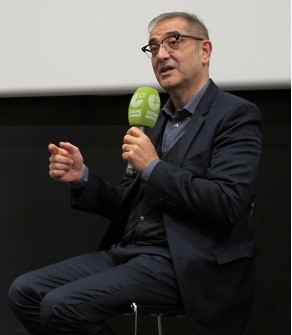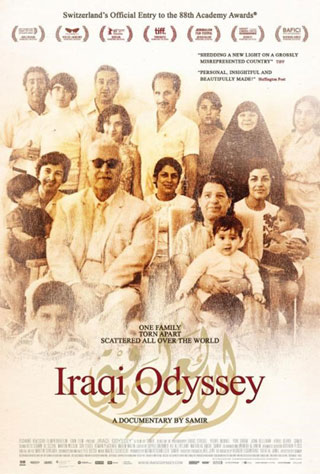Iraqi Odyssey is a long, emotionally engaging documentary about the human costs of the last 60 years of Iraqi history, seen through the eyes of a single family - the family of the filmmaker, Samir. The perspective of one family makes the familiar litany of historical events come alive, in all their terrible tragedy. "I was deeply affected emotionally by making the film," said Samir (who goes by one name) in a Q&A session following the screening.
Samir, who was born in Baghdad and grew up in Switzerland (the film is Switzerland's foreign-language Oscar entry for 2016), tracks down relatives over three generations who, due to revolution, coups, countercoups and relentless wars have been scattered across the globe - in Los Angeles, New York, Buffalo, Auckland, Paris, Beirut, Kuwait, London and Moscow. They aren't alone - 4-5 million Iraqis have been displaced from their home country. "I was deeply afraid," Samir said adding that he had to be mindful of government watchdogs while making the film. "I couldn't contact anyone because I knew they were listening." One of his uncles, an ophthalmologist, was tortured, had his family beaten in front of him, and ultimately was declared dead in absentia by a corrupt politician who wanted to appropriate his property in Iraq - and yet on camera the uncle still manages to make jokes about his travails. "We belong to the glass half-full side," said Samir of his family's strength and resilience. "If you don't have anything to laugh about," he said, "you (still) have to laugh otherwise you will die from the ones who torture you."

Q&A with Samir
The film documents the overthrow of the Iraqi King, Faisal II in 1958, the ensuing struggle between the Iraqi communists and fascists that led to the emergence of the Baath party, and the rise of Saddam Hussein, who became sole dictator in 1979. He launched the Iran-Iraq war in 1980 that cost 1 million dead over 8 years, and then invaded Kuwait, which provoked the First Gulf War in 1991, and was followed by the full-scale US invasion in 2003. At each downwards lurch in the country's fortunes, more of Samir's family were forced to emigrate.
Iraqi Odyssey culminates with Samir gathering his extended family members in Switzerland to watch a rough cut of his documentary. In an emotional reunion, his relatives reflect on their differing points of view on Iraq. Jamal Al-Tahir, one of the film's protagonists who speaks English during his interviews and now lives in exile in Moscow, is one of the few who is positive about the country's future. "We must be positive - and it all starts with a dream," he says. Other relatives are far less optimistic about the chances of Iraq reviving itself, arguing that most educated and professional Iraqis have fled and, like many of them, do not have plans to go back. "An odyssey ends with a homecoming," Samir narrates during the film. "This Odyssey will never end."
Religious diversity and acceptance, and references to family members marrying people from different religions is a theme sprinkled throughout the film. Samir's Shiite grandfather marries a Christian and asks her if she wants to be Muslim or Christian. Another relative has a Sunni mother and Shiite father. Samir's aunt marries a Kurd. At the end of the film, Samir's family openly discusses this and says they have managed to integrate Sunnis, Shiites, Kurds, and Christians - and wonder whether the country of Iraq as a whole can do the same. Asked about his personal opinion on the chances of reconciliation in Iraq during his lifetime, Samir says he is hopeful. He cites what he calls a huge "secular" movement in Iraq now, that has seen thousands of Iraqis demonstrating in the streets of Baghdad this summer against government corruption and religious intolerance. He said it is "led by the young people through social media...People are fed up with religion interfering with politics."
Iraqi Odyssey showcases a collection of "rare documents from private and state archives including Ottoman film footage." Samir said the last 3 years of editing were the most intense and complicated, because of the challenges of tracking down historic material to illustrate the early years of the film. "I had a long list of images I thought I could get from the national archives," said Samir. He traveled to Baghdad to ask permission for access to the national archives, but came away empty-handed. "It was really a tragedy to be there and to realize that there was nothing, nothing... it's all destroyed - mostly in the 2003 war." So he had to search elsewhere for images of Iraq from before the US invasion. Just like his own family, Iraq as a whole has in many ways lost control of its own identity and its own fate, and like the eponymous Greek mythological hero, it remains to be seen when this particular Odyssey will reach its final homecoming.

